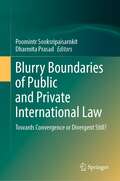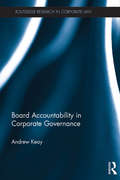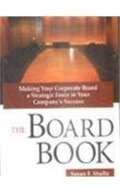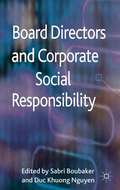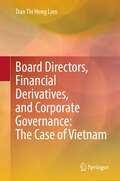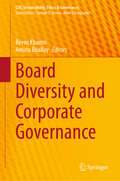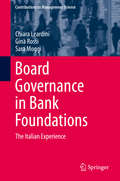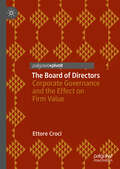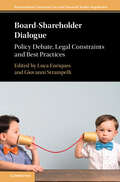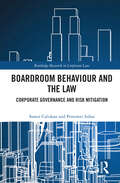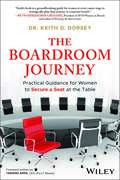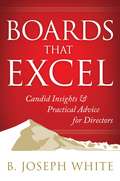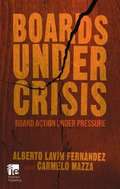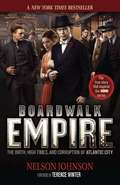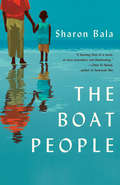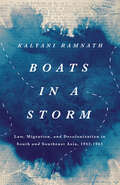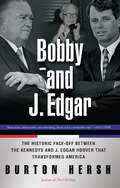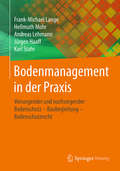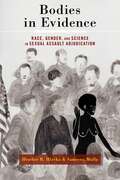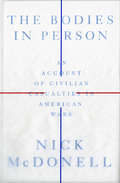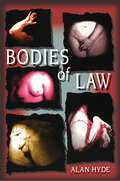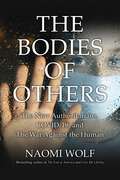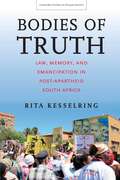- Table View
- List View
Blurry Boundaries of Public and Private International Law: Towards Convergence or Divergent Still?
by Poomintr Sooksripaisarnkit Dharmita PrasadThis book examines interactions and discusses intersectionality between public international law and private international law. With contributions from scholars from USA, Canada, Australia, India and EU, this book brings out truly international perspectives on the topic. The contributions are arranged in four themes—Public international law and private international law: historical and theoretical considerations of the boundary; Harmonisation of private international law by public international law instruments: evaluation of process, problems, and effectiveness; Case studies of intersectionality between public international law and private international law; Future trends in the relationship between public international law and private international law. The ultimate aim of this book is to analyse whether these two legal disciplines become convergent or they are still divergent as usual. With wide coverage spanning across these four themes, the book has takeaways for a wide readership. For scholars and researchers in the fields of public international law and private international law, this book sparks further thoughts and debates in both disciplines and highlight areas for continuing research. For practitioners, this book offers fresh insights and perspectives on contemporaneous issues of significance. This book is also be a great resource for students at both undergraduate and postgraduate levels taking subjects such as public international law or private international law or some related disciplines such as international sale of goods, international trade law or international investment law to advance their knowledge and understanding of the disciplines.
Board Accountability in Corporate Governance (Routledge Research in Corporate Law)
by Andrew KeayWithin corporate governance the accountability of the board of directors is identified as a major issue by governments, international bodies, professional associations and academic literature. Boards are given significant power in companies, and as a consequence it is argued that they should be accountable for their actions. Drawing on political science, public administration, accounting, and ethics literature, this book examines the concept of accountability and its meaning in the corporate governance context. It examines the rationale for making boards accountable, and outlines the obstacles and drawbacks involved in providing for accountability. The book goes on to examine how current mechanisms for ensuring accountability are assessed in terms of fairness, justice, transparency, practicality, effectiveness and efficiency, before discussing the ways that accountability might be improved. Andrew Keay argues that enhanced accountability can provide better corporate governance, helping to reduce the frequency and severity of financial crises, and improve confidence in company practice. As an in depth study of a key element within the exercise of authority and management in corporate entities, this book will be of great use and interest to researchers and students of corporate governance, business and management, and corporate social responsibility.
The Board Book: Making Your Corporate Board a Strategic Force in Your Company's Success
by Susan F. ShultzThe Board Book is the most succinct, reader-friendly guide available to recruiting and managing on-track, top-notch corporate boards.
Board Directors and Corporate Social Responsibility
by Sabri Boubaker Duc Khuong NguyenThis volume introduces readers to recent developments in the fields of board of directors and corporate social responsibility. It also provides new insights and perspectives on corporate governance practices in different countries.
Board Directors, Financial Derivatives, and Corporate Governance: The Case of Vietnam
by Tran Thi LienThis book gives readers a look inside the boardrooms and directors’ minds—a desirable but highly challenging task for researchers due to the lack of access to top teams in organizations. This book breaks through that barrier with a mixed-methods investigation of boardrooms in the emerging country of Vietnam particularly on the topic of financial derivatives. Directors are the leading players within the corporate governance framework. The general effectiveness of the board depends on their roles, processes and competencies. Given the scandals marring the history of the financial industry, this book aims to tackle the question of whether board directors have the financial acumen required to handle the tricky instruments of financial derivatives through interviews with board directors and analysis of their organizations. Providing a managerial perspective of financial derivatives, this distinguishes itself from more popular financial engineering books and would be a useful read for government officials, board directors, training organizations and scholars, particularly in Vietnam.
Board Diversity and Corporate Governance (CSR, Sustainability, Ethics & Governance)
by Reem Khamis Amina BuallayThis book brings together research that advances our understanding of the fundamental relationship between board diversity and different aspects of corporate governance, including corporate governance disclosures, board performance, governance characteristics, and ownership structure. The expertly selected chapters deal with related (but not limited) to the following topics: Corporate governance models and diversity; forms of diversity and decisions in the boardroom; Board diversity, corporate disclosure, and intellectual capital disclosures; shareholder activism; differences between private and family firms; Board diversity laws; gender and ethnicity on boards, and going beyond gender aspects of diversity. This book is particularly useful for researchers and practitioner think tanks to understand the state of the art in board diversity research.
Board Governance in Bank Foundations: The Italian Experience (Contributions to Management Science)
by Chiara Leardini Gina Rossi Sara MoggiBank foundations serve an important purpose in the Italian nonprofit sector. This book presents the legal grounds, areas of intervention, and basic tools involved in the asset management and grant-making activities that such organizations undertake. A special emphasis focuses on the analyses of the organizational structure of bank foundations and the relevant aspects of governance, particularly with regard to the composition, roles, and responsibilities of bank foundation boards. The general reduction in the resources to which they have access requires a new strategy that clearly defines long-term goals and the necessary procedures to achieve them. The topic of strategic planning is therefore also central to this text, which examines its peculiarities, content and governing bodies. The analysis of some case studies provides a better understanding of the manner in which foundations interpret strategic planning and reveals strengths and weaknesses that demand careful attention.
The Board of Directors: Corporate Governance and the Effect on Firm Value
by Ettore CrociBoards of directors are a central feature of any corporate governance regime. The role of directors and how they affect firm value and policies is examined in depth in academic literature. However, it is easy to get both lost and overwhelmed when searching through the literature review that investigates several characteristics, often one at the time. This book provides a careful and concise look at corporate finance literature, specifically with regard to the board of directors, summarizing the main findings and reconciling them. This book documents the pros and cons associated with the various attributes of the board and the directors as found in the current literature and provides sections geared specifically to practitioners in this space, as well, allowing for a better and more comprehensive description of this important corporate governance mechanism. The resulting book aims to facilitate the interpretation of changes in corporate governance through the lens of the recent academic literature.
Board-Shareholder Dialogue: Policy Debate, Legal Constraints and Best Practices (International Corporate Law and Financial Market Regulation)
by Luca Enriques Giovanni StrampelliThis book provides corporate law scholars and students and practitioners at law firms, advisory services firms and asset managers with a comprehensive and rigorous analysis of the financial, managerial, policy and legal issues arising from a key feature of today's corporate governance environment, namely, the dialogue between shareholders and corporate boards. Bringing together top corporate law and corporate governance scholars from the world's leading academic institutions, the collection is characterized by a multi-dimensional approach that takes into account the particularities of some national legal systems and combines theoretical analysis with practical insights into various aspects of board-shareholder dialogue.
Boardroom Behaviour and the Law: Corporate Governance and Risk Mitigation (Routledge Research in Corporate Law)
by null Samet Caliskan null Pereowei SubaiThis book examines how various areas of law collectively influence the relationship between a company and its directors, particularly in safeguarding the long-term interests of stakeholders.Directors' inappropriate actions can expose a company to significant corporate risks, particularly in relation to regulatory violations such as breaches of competition law. When directors engage in such misconduct, company law and corporate governance provide certain control mechanisms that allow the company to manage these risks. Additionally, directors can be discouraged from engaging in such behaviour by the threat of being held accountable for violations of competition law. This book evaluates various tools designed to regulate directors' behaviours and ensure accountability, questioning whether the legal frameworks strike the right balance between corporate liability and personal accountability. It argues that these mechanisms do not sufficiently protect the long-term interests of stakeholders and that shortcomings in the law leave companies vulnerable to directors' misconduct, which cannot be adequately addressed through traditional risk management strategies.This book will be of interest to researchers in the field of corporate law, competition law, and corporate governance.
The Boardroom Journey: Practical Guidance for Women to Secure a Seat at the Table
by Keith D. DorseyEmpower your journey to the corporate boardroom with practical guidance and real-life examples. The Boardroom Journey: Practical Guidance for Women to Secure a Seat Table by Dr. Keith D. Dorsey offers a clear, actionable roadmap for women at any career stage to strategically build a path to the boardroom. The evidence-based strategies and inspiring success stories presented throughout this book have been gleaned from interviews with hundreds of current corporate board members. Specific tactics are outlined for early career professionals shaping their leadership journey, mid-career professionals navigating their way to the C-suite, and current and retired C-suite executives actively seeking their first (or next) corporate board seat. This book helps readers navigate the nuances of these journeys by moving from theoretical insights to actionable advice. The Boardroom Journey is an invaluable guide that helps women assess their personal motivations for career growth and board service, identify suitable boards, and enhance their board readiness through assessment tools and exercises. The book also offers strategies for building and leveraging a network of mentors, sponsors, and allies to gain support and boost confidence throughout the board journey. Inside the book: Discover strategies to effectively prepare for board service Gain insights on how to present and differentiate oneself via five types of capital Learn how to build and leverage a support team The Boardroom Journey is perfect for anyone aspiring to bring their unique perspective to corporate governance. The evidence-based strategies offered here give readers a proven method for charting an intentional path to executive service and securing a seat at the corporate boardroom table.
Boards and Shareholders in European Listed Companies
by Massimo Belcredi Guido FerrariniWith contributions by distinguished scholars from legal and financial backgrounds, this collection of essays analyses four main topics in the corporate governance of European listed firms: (i) board structure, composition and functioning and their interaction with ownership structure; (ii) board remuneration; (iii) shareholder activism and (iv) corporate governance disclosure based on the 'comply or explain' approach. The authors provide new comparative evidence and analyse its implications for the policy debate. They challenge the conventional wisdom that corporate governance in European firms was systematically dysfunctional. While proposals aimed at increasing disclosure and accountability are usually well-grounded, caution is suggested when bringing forward regulatory changes with respect to proposals targeting specific governance arrangements, especially in the fields of board composition and shareholder activism. They argue that the 'comply or explain' principle should be retained and further efforts should be exercised to enhance disclosure.
Boards That Excel
by B. Joseph WhiteThis is a different kind of corporate governance book. With its vivid stories and conversational tone, Boards That Excel is like sitting down with an astute and experienced friend--one who's passionate about what corporate and nonprofit boards can contribute to their organizations' success when they set high aspirations, are clear on purpose, and do the right things in the right way. B. Joseph White, an experienced corporate and nonprofit director and a distinguished academic, argues that boards can enable organizations to do great things, but only when directors go well beyond their duty to oversee and monitor management. White offers a road map for governance success based on his experience with two of America's most successful companies, one public and one private. He knows governance research and distills it to a handful of truly useful insights for boards and directors. He provides clear guidance on the essential work boards must do, and, drawing on behavioral research, he describes how they can ensure the boardroom is a place of good information, thoughtful evaluation, and wise decision making. The book reports on interviews with more than a dozen high-performance board chairs, CEOs, and directors, including Siebel Systems founder Tom Siebel, legendary real estate investor Sam Zell, former Harlem Globetrotters owner Mannie Jackson, GM board chairman and former Cummins chairman and CEO Tim Solso, and volunteer (University of Illinois, University of Michigan) and corporate (Hershey, Bob Evans) director Mary Kay Haben. All speak with unusual candor on what it takes for boards and directors to excel.
Boards Under Crisis
by Alberto Lavín Fernández Carmelo MazzaAn innovative, research-based review of how boards make decisions during crises designed to offer insight and accessible theories for invested senior management facing crises situations. This book gathers recent and historical research on boardroom decision making from the field and business literature to review crises, TMT and decision making. "
Boardwalk Empire: The Birth, High Times, and Corruption of Atlantic City
by Nelson JohnsonTalks about the hidden history of Atlantic City,from its founding as a health resort,its golden age,its post-prohibition fall that continued for decades and its rebirth as a casino resort town.
The Boat People: A Novel
by Sharon BalaFor readers of Khaled Hosseini and Chris Cleave, The Boat People is an extraordinary novel about a group of refugees who survive a perilous ocean voyage only to face the threat of deportation amid accusations of terrorismWhen a rusty cargo ship carrying Mahindan and five hundred fellow refugees from Sri Lanka's bloody civil war reaches Vancouver's shores, the young father thinks he and his six-year-old son can finally start a new life. Instead, the group is thrown into a detention processing center, with government officials and news headlines speculating that among the "boat people" are members of a separatist militant organization responsible for countless suicide attacks—and that these terrorists now pose a threat to Canada's national security. As the refugees become subject to heavy interrogation, Mahindan begins to fear that a desperate act taken in Sri Lanka to fund their escape may now jeopardize his and his son's chance for asylum. Told through the alternating perspectives of Mahindan; his lawyer, Priya, a second-generation Sri Lankan Canadian who reluctantly represents the refugees; and Grace, a third-generation Japanese Canadian adjudicator who must decide Mahindan's fate as evidence mounts against him, The Boat People is a spellbinding and timely novel that provokes a deeply compassionate lens through which to view the current refugee crisis.
Boats in a Storm: Law, Migration, and Decolonization in South and Southeast Asia, 1942–1962 (South Asia in Motion)
by Kalyani RamnathFor more than century before World War II, traders, merchants, financiers, and laborers steadily moved between places on the Indian Ocean, trading goods, supplying credit, and seeking work. This all changed with the war and as India, Burma, Ceylon, and Malaya wrested independence from the British empire. Set against the tumult of the postwar period, Boats in a Storm centers on the legal struggles of migrants to retain their traditional rhythms and patterns of life, illustrating how they experienced citizenship and decolonization. Even as nascent citizenship regimes and divergent political trajectories of decolonization papered over migrations between South and Southeast Asia, migrants continued to recount cross-border histories in encounters with the law. These accounts, often obscured by national and international political developments, unsettle the notion that static national identities and loyalties had emerged, fully formed and unblemished by migrant pasts, in the aftermath of empires. Drawing on archival materials from India, Sri Lanka, Myanmar, London, and Singapore, Kalyani Ramnath narrates how former migrants battled legal requirements to revive prewar circulations of credit, capital, and labor, in a postwar context of rising ethno-nationalisms that accused migrants of stealing jobs and hoarding land. Ultimately, Ramnath shows how decolonization was marked not only by shipwrecked empires and nation-states assembled and ordered from the debris of imperial collapse, but also by these forgotten stories of wartime displacements, their unintended consequences, and long afterlives.
Bobby and J. Edgar: The Historic Face-Off Between the Kennedys and J. Edgar Hoover that Transformed America
by Burton HershNOW WITH A NEW PREFACE In this riveting account of the explosive relationship between Robert F. Kennedy and J. Edgar Hoover, renowned journalist and author Burton Hersh sets their highly publicized clashes in the context of Joe Kennedy’s ongoing manipulation of Congress and his children’s careers, and his lifelong connections to organized crime. Theirs was a unique triumvirate, marked by conflict and betrayal, and culminating in a near-Shakespearean tragedy. Based on compelling new research, and told in gripping anecdotal style, Hersh chronicles the complex relationship between the two antagonists, from their early brushes during the McCarthy years to their controversial deaths.
Bodenmanagement in der Praxis: Vorsorgender und nachsorgender Bodenschutz – Baubegleitung – Bodenschutzrecht
by Karl Stahr Frank-Michael Lange Hellmuth Mohr Andreas Lehmann Jürgen HaaffDie wichtigsten Gesetze und Verordnungen werden vorgestellt und die Rechtslage an Hand aktueller Rechtssprechung dargelegt. Erkundungs- und Bewertungstechniken werden beschrieben und kommentiert und die relevanten Normen und technischen Regelwerke sind aufgef#65533;hrt. Das Buch gliedert sich in die drei Bereiche Altlasten, Abfalltechnik - soweit Bodenkundlich relevant - und Oberbodenmanagement. Letzteres wird im Zuge von Ausgleichsma#65533;nahmen zu Bauvorhaben vermehrt von zust#65533;ndigen Beh#65533;rden eingefordert.
Bodies for Sale: Ethics and Exploitation in the Human Body Trade
by Stephen WilkinsonBodies for Sale: Ethics and Exploitation in the Human Body Trade explores the philosophical and practical issues raised by activities such as surrogacy and organ trafficking. Stephen Wilkinson asks what is it that makes some commercial uses of the body controversial, whether the arguments against commercial exploitation stand up, and whether legislation outlawing such practices is really justified.In Part One Wilkinson explains and analyses some of the notoriously slippery concepts used in the body commodification debate, including exploitation, harm and consent. In Part Two he focuses on three controversial issues (the buying and selling of human kidneys, commercial surrogacy, and DNA patenting) outlining contemporary regulation and investigating both the moral issues and the arguments for legal prohibition.
Bodies in Evidence: Race, Gender, and Science in Sexual Assault Adjudication
by Heather R. Hlavka Sameena MullaWinner, 2021-2022 AES Senior Book Prize, awarded by the American Ethnological SocietyHonorable Mention, Senior Book Prize of the Association for Feminist AnthropologyUncovers how the process of sexual assault adjudication reinforces inequality and becomes a public spectacle of violenceFor victims in sexual assault cases, trials rarely result in justice. Instead, the courts drag defendants, victims, and their friends and family through a confusing and protracted public spectacle. Along the way, forensic scientists, sexual assault nurse examiners, and police officers provide their insight and expertise, shaping the story that emerges for the judge and jury. These expert narratives intersect with the stories of victims, witnesses, and their communities to reproduce our cultural understandings of sexual violence, but too often this process results in reinscribing racial, gendered, and class inequalities. Bodies in Evidence draws on observations of over 680 court appearances in Milwaukee County’s felony sexual assault courts, as well as interviews with judges, attorneys, forensic scientists, jurors, sexual assault nurse examiners, and victim advocates. It shows how forensic science helps to propagate public misunderstandings of sexual violence by bestowing an aura of authority to race and gender stereotypes and inequalities. Expert testimony reinforces the idea that sexual assault is physically and emotionally recognizable and always leaves material evidence. The court’s reliance on the presence of forensic evidence infuses these very familiar stereotypes and myths about sexual assault with new scientific authority. Powerful, unflinching, and at times heartbreaking, Bodies in Evidence reveals the human cost of sexual assault adjudication, and the social cost we all bear when investing in forms of justice that reproduce inequality and racial injustice.
The Bodies in Person: An Account of Civilian Casualties in American Wars
by Nick McDonellSince the beginning of the wars in Iraq and Afghanistan, uncounted thousands of civilians have died in the fighting, and as a result of the destruction. These are deaths for which no one assumes responsibility, and which have been presented, historically, as fallout. No one knows their true number. In The Bodies in Person, Nick McDonell introduces us to some of the civilians who died, along with the rescue workers who tried to save them, U.S. soldiers grappling with their deaths, and everyone in between. He shows us how decent Americans, inside and outside the government and military, looked away from the mounting death toll, even as they claimed to do everything in their power to prevent civilian casualties. With a novelist's eye — and hundreds of hours of recorded interviews — McDonell brings us the untold story of the innocent dead in America's ongoing wars, from leveled cities to drone operation centers to Capitol back rooms. As we follow him around the world, The Bodies in Person raises questions not only about what it means to be an American, but about the value of a life, what it means to risk one, and what is owed afterward.
Bodies of Law
by Alan HydeThe most basic assertions about our bodies--that they are ours and distinguish us from each other, that they are private and have boundaries, races, and genders--are all political theories, constructed in legal texts for political purposes. So argues Alan Hyde in this first account of the body in legal thought. Hyde demonstrates that none of the constructions of the body in legal texts are universal truths that rest solely on body experience. Drawing on an array of fascinating case material, he shows that legal texts can construct all kinds of bodies, including those that are not owned at all, that are just like other bodies, that are public, open, and accessible to others. Further, the language, images, and metaphors of the body in legal texts can often convince us of positions to which we would not assent as a matter of political theory. Through analysis of legal texts, Hyde shows, for example, how law's words construct the vagina as the most searchable body part; the penis as entirely under mental control; the bone marrow that need not be shared with a half-sibling who will die without it; and urine that must be surrendered for drug testing in rituals of national purification. This book will interest anyone concerned with cultural studies, gender studies, ethnic studies, and political theory, or anyone who has heard the phrase "body constructed in discourse" and wants to see, step by step, exactly how this is done.
Bodies of Others: The New Authoritarians, COVID-19 and the War Against the Human
by Naomi WolfThe Bodies of Others is about how we came to the harrowing civilizational crossroads at which we find ourselves - engaged in a war against vast impersonal forces with limitless power over our lives and which threaten the freedoms we have always taken for granted. In her most provocative book yet, Dr. Naomi Wolf shows how these forces—from Big Tech and Big Pharma to the CCP and our oligarchical elites—seized upon two years of COVID-19 panic in sinister new ways, to not only undermine our Republic but to fundamentally reorient human relations. Their target is humanity itself. Their end goal is to ensure that our pre-March 2020 world is gone forever. Irretrievable. To be replaced with a world in which all human endeavor—all human joy, all human fellowship, all human advancement, all human culture, all human song, all human drama, all worship, all surprise, all flirtation, all celebration—is behind a digital paywall. A world in which we will all have to ask technology's permission to be human. But we, the people of the world, did not vote to abandon our old systems and destroy our old ways so absolutely they could never be recovered. And Wolf shows how, against overwhelming odds, we still might win.
Bodies of Truth: Law, Memory, and Emancipation in Post-Apartheid South Africa
by Rita KesselringBodies of Truth offers an intimate account of how apartheid victims deal with the long-term effects of violence, focusing on the intertwined themes of embodiment, injury, victimhood, and memory. In 2002, victims of apartheid-era violence filed suit against multinational corporations, accusing them of aiding and abetting the security forces of the apartheid regime. While the litigation made its way through the U.S. courts, thousands of victims of gross human rights violations have had to cope with painful memories of violence. They have also confronted an official discourse claiming that the Truth and Reconciliation Commission of the 1990s sufficiently addressed past injuries. This book shows victims' attempts to emancipate from their experiences by participating in legal actions, but also by creating new forms of sociality among themselves and in relation to broader South African society. Rita Kesselring's ethnography draws on long-term research with members of the victim support group Khulumani and critical analysis of legal proceedings related to apartheid-era injury. Using juridical intervention as an entry point into the question of subjectivity, Kesselring asks how victimhood is experienced in the everyday for the women and men living on the periphery of Cape Town and in other parts of the country. She argues that the everyday practices of the survivors must be taken up by the state and broader society to allow for inclusive social change in a post-conflict setting.
